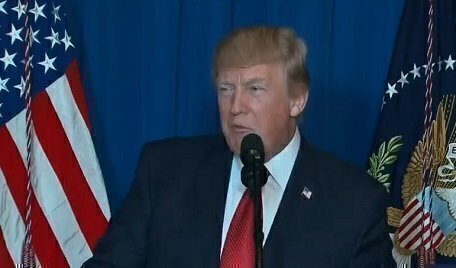On Thursday, President Donald Trump ordered the U.S. forces to launch a missile attack on a Syrian air base he believes played a part in a chemical warfare attack. The move has re-started an old debate about presidential military powers.
 “It is in this vital national security interest of the United States to prevent and deter the spread and use of deadly chemical weapons,” Trump said in a statement about the military strike.
“It is in this vital national security interest of the United States to prevent and deter the spread and use of deadly chemical weapons,” Trump said in a statement about the military strike.
Two Senators, Rand Paul and Tim Kaine, were quick to criticize Trump’s action, which they believe required congressional approval under a 1973 act. But if Donald Trump acts like previous presidents, his administration will argue the attacks were under his constitutional powers and not subject to prior congressional approval.
In recent years, the debate over U.S. military intervention has focused on the statute, called The War Powers Resolution, and one direct part of the Constitution.
Article II of the Constitution spells out that “the President shall be commander in chief of the Army and Navy of the United States, and of the militia of the several states.” The War Powers Resolution, passed by Congress in 1973 over President Nixon's veto, requires that a President must report to Congress within 48 hours after introducing military forces into hostilities and must end the use of such within 60 days unless Congress permits otherwise.
In the ensuing 44 years, most Presidents have ignored parts or all of the War Powers Resolution, considering it illegal or unwarranted. Back in 2011, President Barack Obama ordered a military intervention in Libya without asking for congressional approval. Forces were engaged there for about eight months as the Obama administration argued that its military presence didn’t fall under the Resolution.
In 2013, President Obama took the unusual step of asking Congress to approve intervention in the Syrian civil war, after he initially indicated he had the constitutional powers to order limited military strikes without its approval. Congress then deferred to take action in Syria.
At the time, the Obama administration argued that it didn’t need congressional authorization to expand air strikes in Iraq and Syria. It cited the Authorization for Use of Military Force against Iraq Resolution of 2002, also known as the AUMF of 2002. (The first AUMF was passed right after the 9/11 terrorist attacks.)
The AUMF of 2002 specifically says, “the President is authorized to use the Armed Forces of the United States as he determines to be necessary and appropriate in order to defend the national security of the United States against the continuing threat posed by Iraq.”
That didn’t stop several members of Congress, including Paul and Kaine, from calling for President Obama to formally ask for approval before expanding the attacks beyond the 60-day window required in the War Powers Resolution.
On Friday, Senate Majority Leader Mitch McConnell said President Trump was able to order the missile attack on Syria under the AUMF of 2002.
"I think that this is not a situation that requires an AUMF, authorization for the use of military force," McConnell told radio host Hugh Hewitt. “The previous president thought that it authorized what we were doing in that part of the world, and I expect this president thinks the same," McConnell said.
For now, Congress will continue to debate the AUMF, as it related to ISIS, after it returns from its unofficial recess, which starts on Monday. The Senate started discussing a new AUMF last month, reportedly with the support of Trump administration officials. The Syrian situation will add a new dimension to those talks.
Sign up to receive Constitution Weekly, our email roundup of constitutional news and debate, at bit.ly/constitutionweekly







